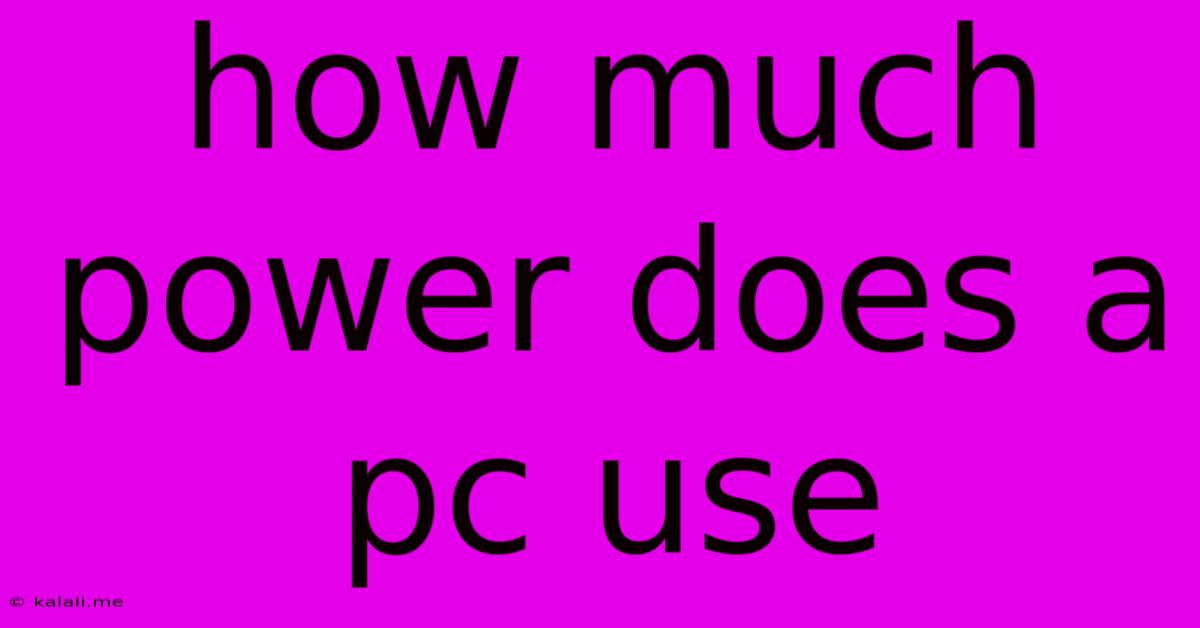How Much Power Does A Pc Use
Kalali
Jun 03, 2025 · 3 min read

Table of Contents
How Much Power Does a PC Use? A Comprehensive Guide
Knowing how much power your PC consumes is crucial for budgeting, environmental awareness, and even troubleshooting performance issues. This comprehensive guide dives deep into the factors influencing your PC's power draw, helping you understand your energy consumption and potentially save money. We'll cover everything from typical wattage ranges to ways to reduce your PC's energy footprint.
Factors Affecting PC Power Consumption
Several components and settings significantly impact your PC's overall power usage. Understanding these factors allows for informed decisions about your hardware choices and operating practices.
1. The CPU (Central Processing Unit): The Brains of the Operation
The CPU is a major power consumer, especially high-end processors designed for demanding tasks like gaming or video editing. A powerful, multi-core processor will naturally draw more power than a low-power, dual-core processor. The clock speed (measured in GHz) and the number of cores directly influence power consumption. Higher clock speeds and more cores generally mean higher power consumption.
2. The GPU (Graphics Processing Unit): Visual Powerhouse
The GPU is another significant power draw, particularly noticeable in gaming PCs or systems used for graphic-intensive tasks such as 3D rendering or video editing. High-end gaming GPUs are notorious for their power hunger. The type of GPU, its clock speed, and the resolution and settings of your games all play a role.
3. RAM (Random Access Memory): Supporting the System
While RAM doesn't consume as much power as the CPU or GPU, high-capacity RAM modules can slightly increase power draw. The type of RAM (DDR3, DDR4, DDR5) also influences its energy consumption, with newer generations often being more efficient.
4. Storage Devices: Hard Drives vs. SSDs
Hard disk drives (HDDs) generally consume more power than solid-state drives (SSDs). SSDs, being significantly faster and more efficient, are a better choice for reducing overall power consumption.
5. Power Supply Unit (PSU): The Power Distributor
The PSU's efficiency is critical. A high-quality, 80+ certified PSU converts power from the wall outlet to the PC components more efficiently, resulting in less wasted energy and lower heat generation. Make sure your PSU is adequately sized for your components; an oversized PSU will not necessarily consume more power at idle.
6. Peripheral Devices: Monitors, Peripherals, and More
External peripherals like monitors, keyboards, mice, and external hard drives also contribute to your PC's overall power consumption. Larger monitors tend to consume more power than smaller ones.
7. System Load and Usage Patterns: Idle vs. Full Load
Your PC's power consumption varies dramatically based on its workload. At idle, with minimal applications running, power consumption is significantly lower. Under heavy load, such as gaming or video editing, power consumption increases substantially.
Typical PC Power Consumption Ranges
A typical desktop PC can range from 50 watts at idle to 300-500 watts under full load. High-end gaming PCs or workstations can easily exceed 500 watts, even reaching 1000 watts or more under extreme loads. Laptops generally consume less power than desktops, usually ranging from 15-100 watts. The exact wattage depends heavily on the components and their usage.
Reducing Your PC's Power Consumption
There are several ways to minimize your PC's energy consumption:
- Choose energy-efficient components: Opt for CPUs and GPUs with good power efficiency ratings.
- Upgrade to an SSD: Replacing your HDD with an SSD reduces power consumption and improves performance.
- Use a high-efficiency PSU: An 80+ Gold or Platinum rated PSU is a worthwhile investment.
- Monitor your power consumption: Use power monitoring software or hardware to track your PC's power usage.
- Manage your system settings: Adjust your power plan settings to prioritize power saving when not under heavy load.
- Turn off peripherals when not in use: Power down monitors and other peripherals when not needed.
By understanding the various factors influencing your PC's power usage and implementing these power-saving strategies, you can reduce your energy consumption, lower your electricity bill, and contribute to a greener environment.
Latest Posts
Latest Posts
-
Water Pressure Regulator How To Adjust
Jun 05, 2025
-
Can You Use Pressure Treated Wood Inside
Jun 05, 2025
-
What Can I Use Instead Of Parsley
Jun 05, 2025
-
Thing That Attaches A Sword To A Hip
Jun 05, 2025
-
First Thing To Do When New Stakeholder Joins
Jun 05, 2025
Related Post
Thank you for visiting our website which covers about How Much Power Does A Pc Use . We hope the information provided has been useful to you. Feel free to contact us if you have any questions or need further assistance. See you next time and don't miss to bookmark.